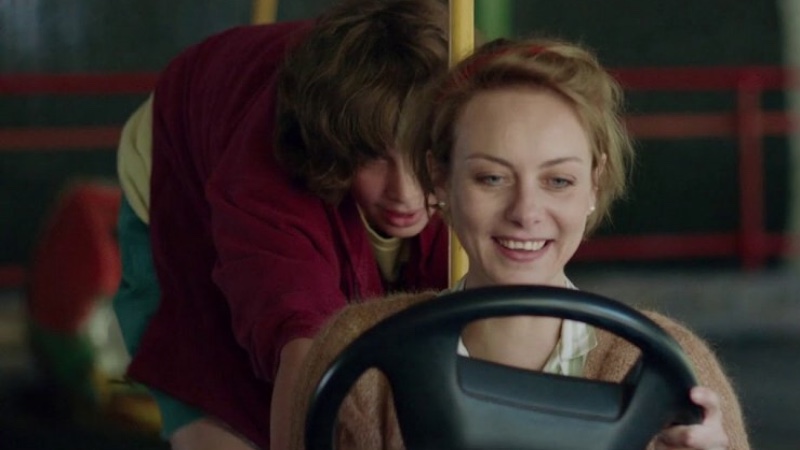QUICK AND DIRTY: LIVE FROM TALLINN
Director, Tomas Vengris and his co-writer, Tatia Rosenthal’s, Five and a Half Love Stories in an Apartment in Vilnius, Lithuania (Penkios su puse meilės istorijos, nutikusios viename Vilniaus bute, 2023), opens on an empty apartment whose walls shake, as plaster and dust fall from the ceiling. This image repeats itself between each of the five stories, which are named after William Shakespeare’s sonnets.
Set in an Airbnb apartment, guests come and go, but it’s not only the theme of love, as the title suggests, that connects this disparate group of people. In some cases, it’s sex, conversation and disagreement. In between each story, host Jolanta (Velta Žygure) prepares the apartment for the new arrivals. The building’s maintenance person, Jokūbas (Vidas Petkevičius), becomes like her shadow, and Jolanta experiences her own touching romance.
The film is a memory of the apartment’s story, a stage upon which episodes of human drama have played out. The vibrating walls and falling plaster suggest the apartment’s life is flashing before its eyes. This is nonsensical, of course. The apartment, made of brick and mortar, has no consciousness, and yet Vengris and Rosenthal create an impression of a life lived by their apartment.
The appeal of stories set in a restricted space taps into the concept of world-building. There’s something in the film’s aura created by collapsing this group of stories into one space or turning this apartment into a dramatic stage for people to share personal moments, even to air their dirty laundry. Perhaps it’s less world building and more to do with peeking into chapters of their lives, where what happens next is unknown. The allure of short stories is the fleetingness of time we spend with characters. In the case of Five and a Half Love Stories…, we’re interested enough to wonder what becomes of the characters once they leave and return home.
The first story, Shall I Compare Thee to a Summer’s Day, Sonnet 18 centres around an Irish hen party, where Meghan (Valene Kane), sister of the bride to be, who married her first love, injures the stripper and struggles when the bridesmaids invite a group of men to the apartment to party. The second story, Love Alters Not, Sonnet 116, features an Israeli couple, Issa (Yiftach Klein) and Galia (Hadar Ratzon Rotem) who are trying for a child. She wants to find out who their family is before they start their own, specifically if a relative was appointed as a Kapo by the Nazis, or saved kids and fought in the uprising. While she’s out, Issa stays to work, but is distracted by the loud upstairs neighbour, whose rampant lovemaking and domestic dispute puts him in a compromising position.
Unlike the succinctness of the first story about the choice Meghan makes that will change her life, or how people see her, it takes longer for the second story to come together. Love Alters Not is the most humorous entry. Its burst of humour comes through Issa’s choice of provocative instead of calming words. At one moment, he says, “I can’t do Holocaust, and IPO, and fertility and the nymphomaniac upstairs, all at once. Enough, I’m at my limit.” The comedy also comes out of the naturally funny scenario with the neighbour, that turns him into what his wife calls a fifteen-year-old when she returns and catches him masturbating.
Arguably the fourth story, Full Many a Glorious Morning Have I Seen, Sonnet 33, about a young man who rents an apartment to impress his boyfriend, should have built on the earlier humour, but fails to. Instead, it exercises too much restraint, and feels like a lethargic story about two young men playing house. It’s left to bridge the third story, So True a Fool Is Love, Sonnet 57, about Philip (Gèza Röhrig), a musician, whose attempts to win back Simona (Adelè Šuminskaitè) goes awry, and even a lustful rendezvous with a young musician doesn’t go his way, and the fifth story, To Me, Fair Friend, You Never Can Be Old, Sonnet 104, about Jolanta’s own intimate connection.
Vengris and Rosenthal’s anthology is, for the most part, consistently solid. Maybe, the fourth story is about insecurity, but it’s passivity and lack of playfulness casts it as the weak link. The first and second entries are different approaches to the short form, but each is effective, as is the final story that brings everything to a fitting conclusion. There’s a certain kinship between the first and third segments with two characters who come to realise how lost they are. Issa and Galia might be the two outliers that symbolise the permanence of love, whereas for all the other characters, love, lust, or human connection is as fleeting as the fate of the building.
While each story is titled after a Shakespearean sonnet, the film doesn’t rely on the audience being familiar with them, nor should it. What’s necessary is that Five and a Half Love Stories… is two films in one. It appears Meghan’s momentary insecurity, comparing herself to others, in which her regret leads to an impulsive and life-changing decision, is inspired by the sonnet. The same seems true of Love Alters Not, but others may be more loose adaptations. Perhaps the point of the film is that the human experience is timeless, even as lives and buildings are dismantled and replaced.
Five and a Half Love Stories in an Apartment in Vilnius, Lithuania just premiered in the Rebels With a Cause Competition of the 27th Tallinn Black Nights Film Festival.









